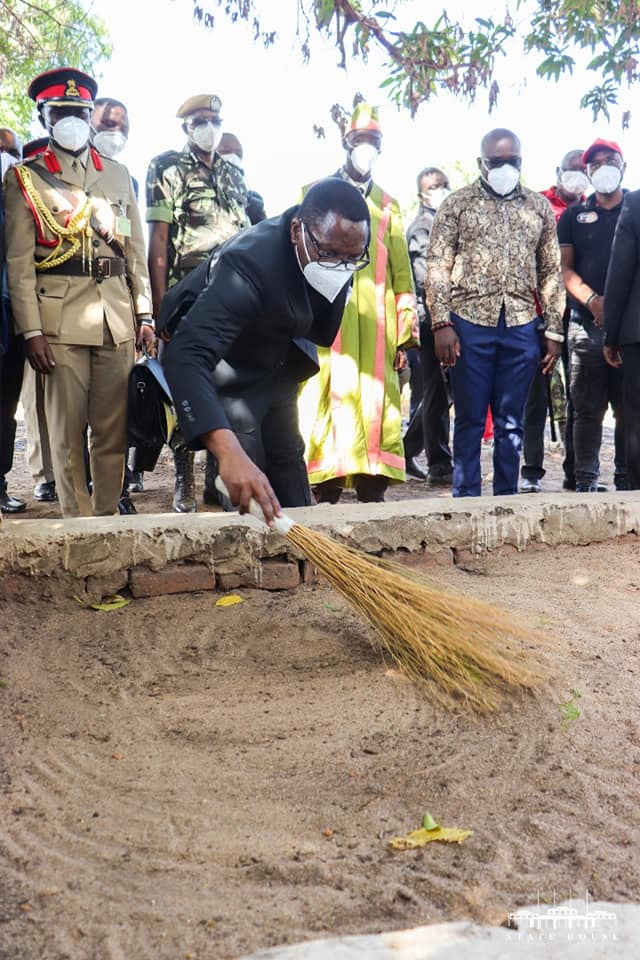By Watipaso Mzungu

President Dr. Lazarus Chakwera has earned himself public praise for publicly apologizing to Malawians for the gross human rights violations perpetrated by the one-party dictatorial regime of Malawi Congress Party (MCP), with the Centre for Human Rights and Rehabilitation (CHRR) expecting the State President to take responsibility for the atrocities.
CHRR executive director Michael Kaiyatsa, in a statement issued on Sunday afternoon, described Chakwera’s apology as an acknowledgement that serious human rights violations were committed during the rule of the party he now leads.
Kaiyatsa stresses that while they are commending the President for the apology, his organization thinks Chakwera should have gone further to tell Malawians what his government is going to do to redress the harm that was caused as well as what is being done to keep them safe from future rights abuses by the state or its agents.
“The best apology, as they say, addresses the future, not just the past. CHRR also observes that an apology in itself is not enough as reparation to victims of serious violations. There is an urgent need for Chakwera to follow up his apology with material forms of reparation, such as compensation. Financial compensation, even if it is not capable of repairing fully the harms suffered, can help to show the seriousness of Chakwera’s apology and dispel suggestions that the President is simply trying to seek an easy way out of his party’s dark past,” he says in the statement.
Kaiyatsa adds that the wounds inflicted by the dictatorial MCP regime in Moto Village and elsewhere are so deep that they cannot be healed by word of mouth only.
He says there is, therefore, an urgent need for the President to follow up his apology with financial compensation to victims.
“In the absence of compensation, Chakwera’s apology will ring hollow and will be deemed insincere and ineffective. The international standards dealing with serious violations of human rights urge states where massive human rights violations have taken place to acknowledge victims through reparations, in addition to pursuing other processes, such as criminal prosecutions, and commissions of inquiry or truth seeking. In this regard, therefore, CHRR calls upon the Chakwera administration to take other reparative measures, such as compensations, to repair the harm done to victims and their families. Without reparations, Chakwera’s apology fails to satisfy the demands of restorative justice,” emphasizes Kaiyatsa.
The CHRR executive director has also asked President Chakwera to honour his commitment to establishing transitional justice mechanisms, such as the much talked about Truth and Reconciliation Commission to facilitate a national healing process.
He says CHRR is surprised as to why the much-touted National Peace and Commission Bill has not been brought to Parliament despite numerous promises by the Chakwera administration that the Bill would be introduced during the current sitting of Parliament.

“We urge the President to expedite this Bill so that it can be tabled in Parliament without much delay. Justice delayed is justice denied. CHRR understands from the President’s State of the Nation Address delivered to the 49th Session of Parliament on 4 September 2020 that one of the responsibilities of this Commission would be “to complete the task left unfinished by the defunct National Compensation Tribunal.” It is our hope that President Chakwera will stick to his word and turn this Tribunal into reality,” says Kaiyatsa.
CHRR has also urged the President to ensure that his plans are in line with the eight objectives of Transitional Justice, which include investigating past human rights abuses, identifying those responsible, imposing sanctions on those responsible (where it can), and providing reparations to victims and preventing future abuses.
In this regard, the human rights watchdog has asked the President to consider instituting a commission of inquiry to establish the full extent of the violations that were committed during the one party regime.
“Such an inquiry would help to put to rest long-standing disputes over what happened during that dark period in our history. We, at CHRR, fully agree with the President that Malawi needs to address the past in order to move forward. We cannot achieve meaningful development if the wounds of the past are left untreated and if no concrete measures are taken to prevent future abuses by the state and its agents,” said Mtambo.
Meanwhile, the Minister of Civic Education and National Unity, Timothy Pagonachi Mtambo, has disclosed that his ministry has finalized drafting a bill that will facilitate the establishment of the long-awaited Malawi Peace and Unity Commission.
Mtambo made the remarks at Mzuzu University on Saturday during a consultation on the development of National Values and Establishment of National Day of Unity and Cultural Heritage.
He said the bill has already been submitted to the Office of the President and Cabinet (OPC) for other processes to take place before tabling it to the National Assembly.
He said once established, the Malawi Peace and Unity Commission will be an independent body entrusted with spearheading the promotion of sustainable peace and unity in the country.
Mtambo further disclosed that the ministry is currently finalizing conceptualization of a Truth and Reconciliation Programme that will ensure that the victims and their families who suffered under government machinery are compensated in one way or the other.
“His Excellency Dr. Lazarus McCathy Chakwera has never shied away from expressing his commitment to ensuring that there is a Truth and Reconciliation Programme with regards the atrocities suffered under previous administrations. The President recognises that his vision of prospering together, as emphasized in his SUPER Hi-5 agenda, cannot be achieved if other people are still in anger and pain,” he said.

